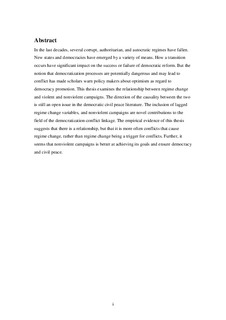| dc.description.abstract | In the last decades, several corrupt, authoritarian, and autocratic regimes have fallen. New states and democracies have emerged by a variety of means. How a transition occurs have significant impact on the success or failure of democratic reform. But the notion that democratization processes are potentially dangerous and may lead to conflict has made scholars warn policy makers about optimism as regard to democracy promotion. This thesis examines the relationship between regime change and violent and nonviolent campaigns. The direction of the causality between the two is still an open issue in the democratic civil peace literature. The inclusion of lagged regime change variables, and nonviolent campaigns are novel contributions to the field of the democratization-conflict linkage. The empirical evidence of this thesis suggests that there is a relationship, but that it is more often conflicts that cause regime change, rather than regime change being a trigger for conflicts. Further, it seems that nonviolent campaigns is better at achieving its goals and ensure democracy and civil peace. | nb_NO |
